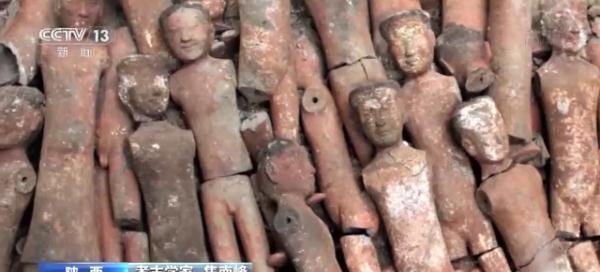At 9 o'clock this morning, the State Administration of Cultural Heritage held an online meeting in Beijing to focus on three important archaeological discoveries and research results in Gansu, Henan and Shaanxi, and Baling, as the mausoleum of Emperor Wen of Han, who opened up the "rule of Wenjing", is of great significance to the study of Emperor Wen of Han and his people and the politics, culture and military of the Western Han Dynasty.
According to historical records, Liu Heng, the Emperor of HanWen, was a very frugal and filial emperor, and the Records of Filial Piety records that "all the tombs were made of pottery, and they were not decorated with gold, silver, copper, and tin, and they did not rule the graves, but wanted to be a province, and did not bother the people." Judging from the current excavation of the Outer Hidden Pit of Baling by archaeologists, it basically confirms the records in the history books.

Archaeologist Jiao Nanfeng: The first is its pottery figurines, and its funerary utensils are one-third of the size, not practical utensils; the other is the excavation of high-grade, especially gold and silver decoration utensils are very few. On the contrary, the carriages and horses unearthed in nanling, that is, his mother's mausoleum, are practical, and then the decoration of the carriage horse has a lot of goldware, goldware, which is obviously better than the imperial tomb. The final result of our discussion was that Emperor Wen himself was frugal, but to bury good things for his mother, that is to say, filial piety, and a good king in terms of private morality.
During the reign of Emperor Wen of Han, he lowered land rents and taxes, reduced military service, and pursued the governing concept of the early Han Dynasty. However, archaeologists found in the archaeological study of Baling that the double cemetery pattern of Baling, symbolizing the layout of the outer hidden pit of the official office around the imperial tomb, etc., are the earliest appearances in the Western Han Emperor's Mausoleum, and experts introduced that these indicate that there was already a preliminary embodiment of Confucianism during the Han Wendi period.
Ma Yongying, researcher of the Shaanxi Provincial Archaeological Research Institute: We all know that the centralization of power was strengthened during the han wudi period, in fact, during the wendi period, the grandfather of the han wudi emperor had already begun to do this work.
Archaeologist Jiao Nanfeng: The line of the mausoleum system is the embodiment of national politics, and the more than 100 outer tibetan pits of the Baling Tomb are facing the imperial tomb, which is a centripetal layout, which is actually a political system that emphasizes the emperor as the center, respect and inferiority, and descends one after another, which is actually the Confucian concept of hierarchy, which is obviously reflected in the mausoleum.
Nowadays, the mystery of the history of Baling has been solved, so that the names of the Eleventh Emperor Mausoleum of the Western Han Dynasty have been determined, and the Baling Tomb is a key link in the development and evolution of the Western Han Imperial Tomb System, making up for an important part of the study of the Western Han Imperial Tombs.
Archaeologist Jiao Nanfeng: We must understand how our Chinese nation was formed and how the Chinese nation developed. There is this line of Chinese civilization from ancient times to the present, but there are always some lines in the middle of this line that are not thick enough, or there are missing rings, and we make up for the missing rings section by section through archaeological proof.
Source: CCTV news client